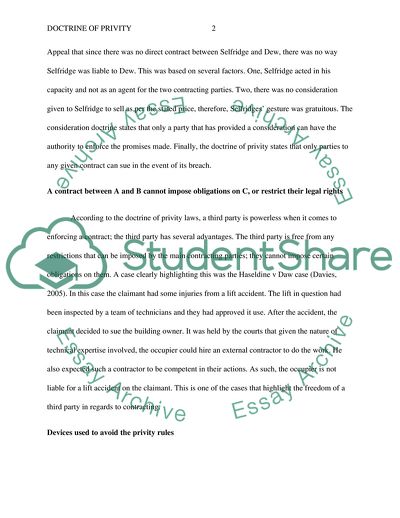Cite this document
(Doctrine of Privity Essay Example | Topics and Well Written Essays - 1500 words, n.d.)
Doctrine of Privity Essay Example | Topics and Well Written Essays - 1500 words. https://studentshare.org/law/1815386-the-doctrine-of-privity-is-commercially-inconvenient-and-can-lead-to-unjust-outcomes-the-enactment-of-the-contracts-rights-of-third-parties-act-1999-gives-effect-to-the-intentions-of-the-parties-without-recourse-to-artificial-devices-it-should-be-welc
Doctrine of Privity Essay Example | Topics and Well Written Essays - 1500 words. https://studentshare.org/law/1815386-the-doctrine-of-privity-is-commercially-inconvenient-and-can-lead-to-unjust-outcomes-the-enactment-of-the-contracts-rights-of-third-parties-act-1999-gives-effect-to-the-intentions-of-the-parties-without-recourse-to-artificial-devices-it-should-be-welc
(Doctrine of Privity Essay Example | Topics and Well Written Essays - 1500 Words)
Doctrine of Privity Essay Example | Topics and Well Written Essays - 1500 Words. https://studentshare.org/law/1815386-the-doctrine-of-privity-is-commercially-inconvenient-and-can-lead-to-unjust-outcomes-the-enactment-of-the-contracts-rights-of-third-parties-act-1999-gives-effect-to-the-intentions-of-the-parties-without-recourse-to-artificial-devices-it-should-be-welc.
Doctrine of Privity Essay Example | Topics and Well Written Essays - 1500 Words. https://studentshare.org/law/1815386-the-doctrine-of-privity-is-commercially-inconvenient-and-can-lead-to-unjust-outcomes-the-enactment-of-the-contracts-rights-of-third-parties-act-1999-gives-effect-to-the-intentions-of-the-parties-without-recourse-to-artificial-devices-it-should-be-welc.
“Doctrine of Privity Essay Example | Topics and Well Written Essays - 1500 Words”. https://studentshare.org/law/1815386-the-doctrine-of-privity-is-commercially-inconvenient-and-can-lead-to-unjust-outcomes-the-enactment-of-the-contracts-rights-of-third-parties-act-1999-gives-effect-to-the-intentions-of-the-parties-without-recourse-to-artificial-devices-it-should-be-welc.


